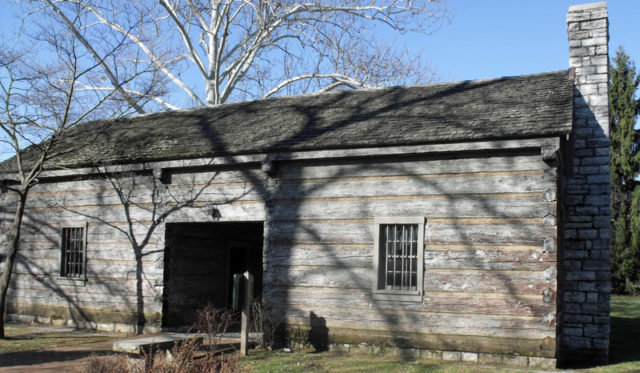Two men terrorized the American frontier in the 18th century out of pure bloodlust.It took authorities years to catch them and put an end to their killing spree. The Harpe Brothers didn’t choose their victims; they just killed everyone who was in their way; men, women, and children.
Not much is known about the brothers’ lives before they started their atrocities. Also, it is hard to separate facts from legends about everything they did. They were probably born in Orange County, North Carolina to a Scottish family, but it is also possible that they were only cousins called Joshua and William Harper who changed their surname when they arrived from Scotland around 1759.
According to this theory, their fathers were probably Tories who fought on the British side during the Revolutionary War. Some people believe that their bloodlust and revenge was motivated by the way their family was treated by their Patriot neighbors.
Micajah “Big” Harpe and Wiley “Little” Harpe took part in the American Revolutionary War, but not because of their great love for the British crown; they simply wanted to kill and torture people. Allegedly, the brothers joined a Tory rape gang in North Carolina. These gangs were war criminals; they raped, stole, burned down properties, and murdered patriot colonists.
According to one account, the gang of which the Harpes were a part managed to kidnap three teenage girls. There was also one more girl, but she was saved by a captain called Frank Wood who managed to shoot and wound Wiley “Little” Harpe. However, this wouldn’t be Captain Wood’s only meeting with the brothers.
Later, the Harpe brothers decided to move to the frontier and settled among the Chickamauga Cherokee people, in the village of Nickajack, Chattanooga, Tennessee.

They stayed there for around 12 years. It was here when the brothers would kidnap two young women and forced them to be their wives. The unfortunate girls were Maria Davidson and Susan Wood, Captain Wood’s daughter. The women were treated worse than animals, beaten, held in chains, and raped. Some stories say that Maria and Susan became pregnant several times and in every case, the brothers killed their children.
The brothers, together with the women, left Nickajack in 1794 after they heard the settlement was going to be attacked by American colonists. They moved to Powell’s Valley near Knoxville, Tennessee. Here they constantly robbed and tortured the helpless pioneers. A few years later, Micajah and Wiley will start their so-called “trail of death” – a killing spree across Tennessee, Kentucky, and Illinois.
In 1797 the deranged brothers were chased out of Knoxville, Tennessee because they were caught stealing hogs and horses and accused of something worse: killing a man, filling his chest with stones, and dumping him in a river. This would become a regular method by which the Harpes disposed of the bodies of their victims – a method that would later mark them as serial killers.
After leaving Knoxville, the brothers continued to Kentucky. Here they murdered a few more people. When authorities started to ask questions, an innkeeper pointed out that they were the ones guilty of the killings. They were pursued and eventually caught and put in prison in Danville, Kentucky.

The Harpes didn’t stay behind bars for long. Somehow, they managed to escape, and the first thing they did was kill the son of the man that helped the authorities catch them.
With a bounty of $300 for each of them placed by Kentucky Governor James Garrard, the brothers were constantly on the run.
On their way north, Big Harpe and Little Harpe killed five more men. When they arrived in southern Illinois, they found refuge in a place called Cave In The Rock. This was the stronghold of Samuel Mason, a notorious river pirate and gang leader who attacked the slow flatboats that were sailing the Ohio River. Very soon, the Mason Gang noticed that something was not right with the brothers. Some of the extremely violent and appalling things they did to people were too much even for this ruthless pirate gang. Things went too far when the Harpes started to take captured people to the top of a cliff, stripped them naked, and killed them by forcing them to fall. The Mason Gang decided that it was time for them to leave and drove them off from their stronghold.

The vicious murderers, together with their wives and children, returned to Tennessee. The killings didn’t stop, in fact, they started killing, even more, people: William Ballard, who had been disemboweled and thrown in the Holton River; James Brassel, who had his throat slashed and was found on Brassel’s Knob; and John Graves and his teenage son, who were found dead with their heads axed. In Logan County, the brothers killed a little girl, a young slave, and an entire family they found asleep in their camp.
In August 1798, Big Harpe committed his most terrible crime – he smashed his baby daughter’s head against a tree. He said he did it because she annoyed him by constantly crying. Later, he stated that this was the only killing that he felt remorse for. A week later, the brothers embarked on one more terrible murder spree.
The Stegall family in Webster County offered them shelter in their house. They were unaware of the terrible people that they were letting inside. That night, the Harpes killed another guest named Major William Love, the Stegall’s four-month-old child (because he cried), and Mrs. Stegall, when she screamed after she saw her dead child.
Soon, a new posse was organized by a man called John Leiper. Moses Stegall, the father and husband of the recently killed members of the Stegall family, also joined this hunting party. The posse managed to track down the Harpes on 24 August 1799. When the brothers were asked to surrender, they decided to flee. In this attempt, Micajah Harpe was shot in the leg and pulled down of his horse by Leiper. While Micajah was dying, he confessed to twenty of the countless murders that he had committed. After the confession, Moses Stegall cut off the murderer’s head while he was still conscious. The head was spiked on a pole near the Stegall homestead. The place where the head was standing is still known as Harpe’s Head Road.
Micajah’s brother, Little Harpe, managed to escape and returned to the Mason Gang.
He stayed with them for four years (under the alias John Setton) until he got caught up in his own plot – a plot to kill and turn in the leader of the gang, Samuel Mason. Mason had a huge bounty on his head; Harpe and another gang member killed Mason, cut off his head, and brought it to the authorities. Unfortunately for them, they were immediately recognized as wanted criminals and brought to justice.

Little Harpe was executed in January 1804, and his head was spiked on a pole on Natchez Road.
Read another story from us: The Zodiac Killer: One of the most infamous serial killers in America
His execution put an end to the fear that haunted the American frontier for years. A gruesome chapter was finished. Besides the Harpes’ confession that they killed only 39 people, the real number was greater, closer to 60, and maybe even more. The actual scale of their crimes will perhaps never be known.
